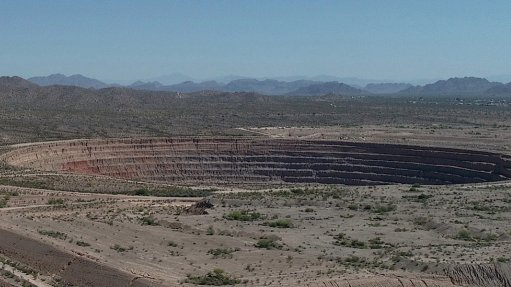Giant private mining companies getting away with no obligation to report anything publicly

AmaranthCX director Paul Miller interviewed on transparency by Mining Weekly’s Martin Creamer. Video: Darlene Creamer.
JOHANNESBURG (miningweekly.com) – A globally significant chrome producer operating six chrome mines and employing 7 000 people inside South Africa – with a social labour plan obligation on every mine, with tax and royalty obligations paid to the State – is permitted to operate in this country with no ongoing public disclosure requirements.
Yet a tiny exploration company with six employees that happens to have listed on the stock exchange, would have the full King Code to contend with.
“It’s not that public companies have an onerous obligation. Public companies, because they are significant and they have public shareholders, probably have the right amount of reporting obligations. The problem is that large, significant private companies have no obligations to report to the public at large – and reporting to the Companies and Intellectual Property Commission (CIPC), where the document disappears, and nobody ever sees it again, is by no means reporting to the public at large,” says AmaranthCX director and owner Paul Miller, who spoke to Mining Weekly in a Zoom interview. (Also watch attached Creamer Media video.)
If large listed companies are asked to report comprehensively simply because they are listed, and socially, environmentally and economically significant private companies do not have to report anything at all, why would any company choose to be listed if they can find the capital elsewhere?
“I think that is a big part of why we’re seeing an ever diminishing number of listed companies, not because they have to report too much, or what they have to report is too onerous, but because there’s no equivalent requirement for equally significant companies that are not listed.
“We’ve got to close that gap and we’ve got to stop saying that a company needs to report because they’re listed. Stakeholders are no longer only shareholders, but civil society, employees and the environment itself. If a company is having an impact on all those things, it should have the same reporting obligations. But we're not seeing that,” Miller emphasised, citing the example of being able to go to Companies House in the UK and request, for five pounds, any UK company’s financial statements.
“In South Africa you can hide away because you are not listed and it goes even further. Our State makes it very difficult to access data,” Miller adds.
Transparency is important and it is interesting how South Africa has chosen its own unique path on how the country goes about ensuring transparency in the mining industry, even though the minerals of South Africa are held in custodianship for the benefit of all people of South Africa.
In addition to some large mining companies having no obligation to report to the citizens of the country whose minerals they are exploiting, the ownership of a mining right or a prospecting right is also allowed to be hidden.
South Africa has gone from 770 JSE-listed companies to about 305 still trading “and at the same time, we’re piling all the reporting requirements on to this ever-diminishing group of companies that happen to be listed – and yet giant significant private companies, or companies that don’t have more than 100 shareholders, don’t have to report anything publicly”.
With mining being socially, environmentally and economically significant, all mining companies should, in his view, be public companies.
Well established globally, he says, is the concept that a listed company reports to a whole range of stakeholders. No major listed company reports only financial information to shareholders; they also have to report on their environmental, social and labour performance.
“Certainly, we see that in South Africa as well, but only in listed companies and in State-owned enterprises, and that’s interesting because surely if your reporting and your interest groups are way more than just shareholders, why is it only companies that have public shareholders that have to report?
“Think about this for a moment. We have companies that have a high social, environmental and economic significance in our economy and yet they have no public disclosure requirements.
“The gap between large significant private companies that have tremendous impacts on society and the environment as a whole, and companies that may be smaller and have less significance, but simply happen to be listed, have to disclose far more, and that surely makes no sense.
“If we have moved from shareholder capitalism to stakeholder capitalism, then every company with a significant impact on stakeholders generally should have the same reporting requirements as a company that simply happens to have a portion of its balance sheet or capital as a listed security on the stock exchange,” says Miller.
In 2008, the Companies Act appeared to recognise that a company can be significant without being listed and introduced a concept of public interest entities.
“Now they’ve got an elaborate method of scoring public interest entities and there are some consequences that come if a company is a public interest entity. For example, such a company may have to have a social and ethics committee. Alternatively, audited financials may have to be submitted to CIPC.
“However, where it gets strange is that the public interest documents submitted are not public. The public interest is not served by the fact that public interest entities have to submit documents to government and perhaps they should be called government interest entities.
"What South Africa has are some major mining companies, with significant environmental rehabilitation, tax and royalty obligations and a huge number of employees that have no obligation to report to the citizens of the country whose minerals they are exploiting," he says.
South Africa has no transparent mining cadastre, the system for managing mining rights.
“We don’t know who has what mining right or prospecting right, where and for how long, and for what commodity. That might have been disclosed during the application process, but it is not ongoing public information,” he points out.
South Africa’s mining legislation has no requirement for the beneficial owners of mining rights and prospecting rights to be declared. Ownership of a mining right or a prospecting right can be hidden.
The Department of Mineral Resources and Energy does ask that 26% of shareholders have to be historically disadvantaged South Africans but does not ask for the identities of the owners of the other 74%.
“So, we could have a uranium mine owned by the government of North Korea and the public wouldn’t know,” Miller points out.
He also criticises organised mining industry, in this case Minerals Council South Africa, for not matching disclosure requirements that would be considered routine elsewhere in the world.
Article Enquiry
Email Article
Save Article
Feedback
To advertise email advertising@creamermedia.co.za or click here
Press Office
Announcements
What's On
Subscribe to improve your user experience...
Option 1 (equivalent of R125 a month):
Receive a weekly copy of Creamer Media's Engineering News & Mining Weekly magazine
(print copy for those in South Africa and e-magazine for those outside of South Africa)
Receive daily email newsletters
Access to full search results
Access archive of magazine back copies
Access to Projects in Progress
Access to ONE Research Report of your choice in PDF format
Option 2 (equivalent of R375 a month):
All benefits from Option 1
PLUS
Access to Creamer Media's Research Channel Africa for ALL Research Reports, in PDF format, on various industrial and mining sectors
including Electricity; Water; Energy Transition; Hydrogen; Roads, Rail and Ports; Coal; Gold; Platinum; Battery Metals; etc.
Already a subscriber?
Forgotten your password?
Receive weekly copy of Creamer Media's Engineering News & Mining Weekly magazine (print copy for those in South Africa and e-magazine for those outside of South Africa)
➕
Recieve daily email newsletters
➕
Access to full search results
➕
Access archive of magazine back copies
➕
Access to Projects in Progress
➕
Access to ONE Research Report of your choice in PDF format
RESEARCH CHANNEL AFRICA
R4500 (equivalent of R375 a month)
SUBSCRIBEAll benefits from Option 1
➕
Access to Creamer Media's Research Channel Africa for ALL Research Reports on various industrial and mining sectors, in PDF format, including on:
Electricity
➕
Water
➕
Energy Transition
➕
Hydrogen
➕
Roads, Rail and Ports
➕
Coal
➕
Gold
➕
Platinum
➕
Battery Metals
➕
etc.
Receive all benefits from Option 1 or Option 2 delivered to numerous people at your company
➕
Multiple User names and Passwords for simultaneous log-ins
➕
Intranet integration access to all in your organisation



















